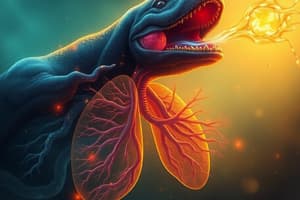Podcast
Questions and Answers
Which part of the respiratory system directly connects to the bronchial tubes?
Which part of the respiratory system directly connects to the bronchial tubes?
- Pharynx
- Trachea (correct)
- Larynx
- Alveoli
What happens to the air in the alveoli during breathing?
What happens to the air in the alveoli during breathing?
- It is expelled unchanged.
- It gets oxygenated. (correct)
- It becomes cool and dry.
- It is heated and humidified. (correct)
Which structure primarily prevents food from entering the airway?
Which structure primarily prevents food from entering the airway?
- Bronchi
- Nasal cavity
- Epiglottis (correct)
- Lungs
During the process of inhalation, which muscle plays a crucial role in expanding the chest cavity?
During the process of inhalation, which muscle plays a crucial role in expanding the chest cavity?
Which statement correctly describes the air flow path when breathing in?
Which statement correctly describes the air flow path when breathing in?
What is a primary characteristic of the air that is inhaled compared to the air that is exhaled?
What is a primary characteristic of the air that is inhaled compared to the air that is exhaled?
Which statement correctly describes the composition of inhaled and exhaled air?
Which statement correctly describes the composition of inhaled and exhaled air?
What misconception about inhaled and exhaled air is highlighted?
What misconception about inhaled and exhaled air is highlighted?
In the process of gas exchange, which gas primarily increases in concentration during exhalation?
In the process of gas exchange, which gas primarily increases in concentration during exhalation?
What is a key factor that differentiates inhaled air from exhaled air in terms of gas composition?
What is a key factor that differentiates inhaled air from exhaled air in terms of gas composition?
Which statement about exhaled air is true?
Which statement about exhaled air is true?
Which of the following statements about the composition of inhaled air is false?
Which of the following statements about the composition of inhaled air is false?
What is the primary caution to take when handling dry cobalt chloride paper?
What is the primary caution to take when handling dry cobalt chloride paper?
Which statement describes a significant difference between inhaled and exhaled air?
Which statement describes a significant difference between inhaled and exhaled air?
What color change indicates the presence of moisture on the cobalt chloride paper?
What color change indicates the presence of moisture on the cobalt chloride paper?
Which of the following gases is predominantly found in inhaled air?
Which of the following gases is predominantly found in inhaled air?
Which statement regarding nitrogen in air is correct?
Which statement regarding nitrogen in air is correct?
What might happen if the cobalt chloride paper is touched with moist hands?
What might happen if the cobalt chloride paper is touched with moist hands?
Which of the following diseases is NOT typically associated with smoking?
Which of the following diseases is NOT typically associated with smoking?
What are some diseases that smoking is known to cause?
What are some diseases that smoking is known to cause?
What statement best describes the impact of smoking on global health?
What statement best describes the impact of smoking on global health?
Which system of the body is particularly affected by smoking-induced diseases?
Which system of the body is particularly affected by smoking-induced diseases?
What is the relationship between smoking and cardiovascular diseases?
What is the relationship between smoking and cardiovascular diseases?
What effect does tar from cigarette smoke have on the lungs?
What effect does tar from cigarette smoke have on the lungs?
How does carbon monoxide in cigarette smoke affect the blood?
How does carbon monoxide in cigarette smoke affect the blood?
What happens to the walls of air sacs due to certain chemicals in cigarette smoke?
What happens to the walls of air sacs due to certain chemicals in cigarette smoke?
What is a significant characteristic of the lung tissue of smokers compared to non-smokers?
What is a significant characteristic of the lung tissue of smokers compared to non-smokers?
In the context of lung health, how does smoking contribute to decreased oxygen levels in the blood?
In the context of lung health, how does smoking contribute to decreased oxygen levels in the blood?
What is the primary consequence of decreased surface area in air sacs due to smoking?
What is the primary consequence of decreased surface area in air sacs due to smoking?
What role does cigarette smoke play in altering lung physiology?
What role does cigarette smoke play in altering lung physiology?
How might the appearance of lung tissues differ between a smoker and a non-smoker?
How might the appearance of lung tissues differ between a smoker and a non-smoker?
Flashcards
Cobalt Chloride Paper Color Change
Cobalt Chloride Paper Color Change
Cobalt chloride paper changes color depending on the presence of moisture in the air.
Dry Cobalt Chloride Paper
Dry Cobalt Chloride Paper
Cobalt chloride paper that has no moisture absorbed.
Moisture on Mirror
Moisture on Mirror
The water vapor from breathing absorbed by the mirror.
Mirror Preparation for Experiment
Mirror Preparation for Experiment
Signup and view all the flashcards
Color Change Observation
Color Change Observation
Signup and view all the flashcards
Effect of Breathing, on Cobalt chloride paper
Effect of Breathing, on Cobalt chloride paper
Signup and view all the flashcards
Experiment Setup 1
Experiment Setup 1
Signup and view all the flashcards
Experiment Setup 2
Experiment Setup 2
Signup and view all the flashcards
Breathing path
Breathing path
Signup and view all the flashcards
Bronchioles
Bronchioles
Signup and view all the flashcards
Air flow
Air flow
Signup and view all the flashcards
Inhalation
Inhalation
Signup and view all the flashcards
Exhalation
Exhalation
Signup and view all the flashcards
Gas Exchange in Air Sacs
Gas Exchange in Air Sacs
Signup and view all the flashcards
Inhaled vs. Exhaled Air Composition
Inhaled vs. Exhaled Air Composition
Signup and view all the flashcards
Inhaled air composition
Inhaled air composition
Signup and view all the flashcards
Exhaled air composition
Exhaled air composition
Signup and view all the flashcards
Gas Exchange Difference
Gas Exchange Difference
Signup and view all the flashcards
Exhaled air composition
Exhaled air composition
Signup and view all the flashcards
Nitrogen in air
Nitrogen in air
Signup and view all the flashcards
Air sacs in lungs
Air sacs in lungs
Signup and view all the flashcards
Inhaled air
Inhaled air
Signup and view all the flashcards
Exhaled air
Exhaled air
Signup and view all the flashcards
Gas exchange
Gas exchange
Signup and view all the flashcards
Surface area of lungs
Surface area of lungs
Signup and view all the flashcards
Components of inhaled air
Components of inhaled air
Signup and view all the flashcards
Smoking-related diseases
Smoking-related diseases
Signup and view all the flashcards
Global smoking deaths
Global smoking deaths
Signup and view all the flashcards
Smoking's impact on lifespan
Smoking's impact on lifespan
Signup and view all the flashcards
Lung cancer
Lung cancer
Signup and view all the flashcards
Mouth cancer
Mouth cancer
Signup and view all the flashcards
Stroke
Stroke
Signup and view all the flashcards
Bronchitis
Bronchitis
Signup and view all the flashcards
Smoking's global health impact
Smoking's global health impact
Signup and view all the flashcards
Reduced Lung Gas Exchange
Reduced Lung Gas Exchange
Signup and view all the flashcards
Carbon Monoxide's Effect
Carbon Monoxide's Effect
Signup and view all the flashcards
Air Sac Damage
Air Sac Damage
Signup and view all the flashcards
Pig Lung Tissue Comparison
Pig Lung Tissue Comparison
Signup and view all the flashcards
Pig Trachea Differences
Pig Trachea Differences
Signup and view all the flashcards
Gas Exchange Efficiency
Gas Exchange Efficiency
Signup and view all the flashcards
Smoker's Lung Tissue
Smoker's Lung Tissue
Signup and view all the flashcards
Non-Smoker's Lung Tissue
Non-Smoker's Lung Tissue
Signup and view all the flashcards
Study Notes
Gas Exchange in Animals
- Gas exchange occurs in animals as well as plants
- Practical 7.12 investigated the change in carbon dioxide content in a boiling tube with mealworms.
- The aim was to find the change in carbon dioxide content.
- Materials included boiling tubes, forceps, cotton thread, test-tube rack, mealworms, measuring cylinder (10 cm³), and hydrogencarbonate indicator.
- Add 3cm³ of hydrogencarbonate indicator to two boiling tubes, record the colour.
- Place mealworms in a plastic vial with holes, secure in one tube (A).
- Seal both tubes, and leave for an hour. Record the colour change in the indicator.
- In tube A, the indicator changed from red to yellow, indicating carbon dioxide production, while tube B (control) remained red.
- Mealworms release carbon dioxide during respiration.
Practical 7.13
- To find out the change in oxygen content in a boiling tube with mealworms.
- Materials: boiling tubes, capillary tubes, wire gauze, ruler, soda lime, 2 bags, and mealworms.
- Capillary tubes were fitted with colour markers.
- The system used soda lime to absorb carbon dioxide.
- Set up the apparatus as instructed.
- Monitor the movement of the colour marker over time.
- The colour marker moved in direction because the oxygen was consumed, causing a pressure difference.
Gas Exchange in Humans
- Humans have a well-developed breathing system for gas exchange, allowing oxygen supply to body cells for respiration. It removes carbon dioxide.
- The activity investigated the differences between inhaled and exhaled air.
Gas Exchange at the Air Sacs
- Oxygen and carbon dioxide exchange between air and blood in the air sacs.
- Inhaled air enters the air sacs, oxygen moves into the blood, and carbon dioxide moves from the blood to the air sacs.
- Blood carries oxygen to body cells for respiration.
- Blood carries carbon dioxide to the air sacs to be excreted from the body during exhalation.
- Air sacs are moist and warm the air.
Effects of Smoking on Gas Exchange
- Smoking introduces over 7000 chemicals into the body.
- Chemicals damage the breathing system, reducing the efficiency of gas exchange.
- Tar deposits in lungs, limiting the surface area of air sacs
- Carbon monoxide reduces oxygen-carrying capacity of blood, reducing oxygen intake.
- Chemicals damage the air sacs, further decreasing the surface area for gas exchange.
Harmful Effects of Smoking (Longer Term)
- Smoking harms nearly every part of the body.
- Various cancers, heart diseases, and strokes are associated with smoking.
- Life expectancy is reduced by approximately 10 years for smokers.
- Over 8 million deaths worldwide are attributed to smoking-related diseases.
Effects of Smoking on Pig Lungs
- Cigarette smoke, when forced into the pig lungs, causes them to darken and the trachea lining darkens.
- The presence of brown substances in the tissue of smoking pig lungs, absent in non-smoking pig lungs, indicates damage.
- The colour change demonstrates damage to the respiratory system by smoking.
Other Aspects
- Different animals use different structures for gas exchange (gills, external gills, skin).
- The large surface area of air sacs in human lungs increases the efficiency of gas exchange, similar to a badminton court.
- Electronic cigarettes are also harmful and banned in Hong Kong due to the harmful constituents in the vapour.
- Hong Kong has policies to discourage smoking, including indoor smoking bans, health warnings, and increased tobacco tax.
Studying That Suits You
Use AI to generate personalized quizzes and flashcards to suit your learning preferences.
Related Documents
Description
Explore the gas exchange process in animals through practical investigations involving mealworms. This quiz covers the procedures and results from experiments aimed at measuring carbon dioxide and oxygen content changes using hydrogencarbonate indicator. Test your understanding of the concepts and materials used in these experiments.




